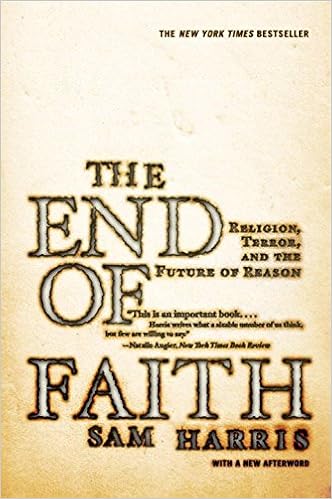In a time of unprecedented level of peace, prosperity and individual freedom, the majority of humankind in the 21st century nominally reach back for moral foundations to scriptures written thousands of years ago by scribes of desert-dwelling, xenophobic illiterates following a wrathful and jealous god. Since the dawn of civilization, religion served as much as the engine of war and sadism as a tool of personal guidance and consolation, and almost continuously the main obstacle of scientific progress and human flourishing.
The End of Faith was Sam Harris' first and, so far, most influential book. It propelled him from total obscurity to the role of a celebrated and vilified public intellectual, and eventually to global internet stardom.
Watching as Harris makes short work of traditional public discourse taboos and orthodoxies is delightfully refreshing (or horrifying, depending on the reader's views). Anyone who ever felt the proclamations like "religions deserve utmost respect" or "it's impolite to question others' beliefs" empty and sanctimonious, will feel vindicated.
And religion had it coming. In a confident, but clear and logical style Harris refutes the morality of the Abrahamic religions and dispels the regular arguments for justifying their usefulness. Science was not born from Christianity. In a world where everyone was - at least nominally - Christian, there was simply no one else to do the job. Fascism, communism or the Jacobinists were not atheist movements, as Christian apologists love to point out. They were monstrous exactly because they were, in fact, religions, sans the supernatural. Whatever is good in religion - a force for social cohesion, a provider of moral guidelines - could be obtained from secular humanism. Whatever is bad, is so plentiful that it's a chore to enumerate, but the book makes a decent stab at it.
Although Judaism and Christianity get their fair share of damning criticism, the book is especially concerned with Islam, which Harris sees as a civilizational threat - a fourteenth-century death-cult combined with the existence of nuclear weapons. He challenges the orthodox assumption the religious terrorism is driven by political and economic reasons, where religion is just a pretext. In reality, Harris argues, the roles are reversed. The well of Islamic terrorism is Islam itself, and fanatical fundamentalists don't misinterpret the Quoran. They take it literally.
The book is extremely blunt - although maybe only seems so because criticism of its target is still considered a sign of bad manners -, but it's sober and well-grounded. It's meant to confront the readers directly with the reality as the author perceives it. Harris is a very rational thinker, who is absolutely flabbergasted by the irrationality of his fellow humans.

No comments:
Post a Comment